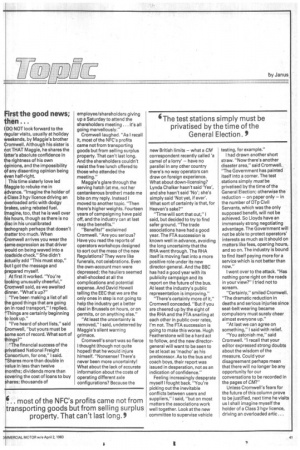'The test stations simply must be privatised by the time of the General Election. 9
Page 39

If you've noticed an error in this article please click here to report it so we can fix it.
new British limits — what a CM correspondent recently called 'a camel of a lorry' — have no parallel in any other country there's no way operators can draw on foreign experience. What about down-licensing? Lynda Chalker hasn't said 'Yes', and she hasn't said 'No'; she's simply said 'Not yet, if ever'. What sort of certainty is that, for Heaven's sake?"
"Time will sort that out," I said, but decided to try to find safer ground. "The trade associations have had a good year. The FTA succession is known well in advance, avoiding the long uncertainty that the RHA went through. The RHA itself is moving fast into a more positive role under its new director-general. And the BBC has had a good year with its publicity campaign and its report on the future of the bus. At least the industry's public representation is improving."
"There's certainly more of it," Cromwell conceded. "But if you are cheered up by the sight of the RHA and the FTA snarling at each other in public over rates, I'm not. The FTA succession is going to make this worse. Hugh Featherstone will be a hard act to follow, and the new directorgeneral will want to be seen to be at least as 'macho' as his predecessor. As to the bus and coach boys, their report was issued in desperation, not as an indication of confidence."
Feeling increasingly desperate myself I fought back. "You're picking out the inevitable conflicts between users and suppliers," I said, "but on most matters the associations work well together. Look at the new committee to supervise vehicle testing, for example."
I had drawn another short straw. "Now there's another disaster area," said Cromwell., "The Government has painted itself into a corner. The test stations simply must be privatised by the time of the General Election; otherwise the reduction — on paper only — in the number of DTp Civil Servants, which was the only supposed benefit, will not be achieved. So Lloyds have an immensely strong negotiating advantage. The Government will not be able to protect operators' interests as much as it should on matters like fees, opening hours, and so on. The industry is bound to find itself paying more for a service which is not better than now."
I went over to the attack. "Has nothing gone right on the roads in your view?" I tried not to scream.
"Certainly," smiled Cromwell. "The dramatic reduction in deaths and serious injuries since seat-belt wearing became compulsory must surely cheer almost everyone up."
"At last we can agree on something," I said with relief.
"You astonish me," said Cromwell. "I recall that your editor expressed strong doubts about the wisdom of the measure. Could your disagreement perhaps mean that there will no longer be any opportunity for our conversations to be recorded in the pages of CM?"
Unless Cromwell's fears for the future of this column prove to be justified, next time he visits us I shall imagine myself the holder of a Class 3 hgv licence, driving an overloaded artic












































































